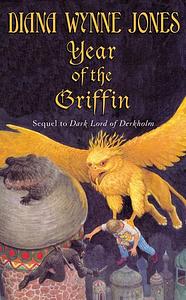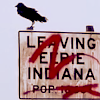You need to sign in or sign up before continuing.
Take a photo of a barcode or cover
Was cleverly written and just so engrossing, wonderful and magical. Really loved it.
The internal logic of Jones' books is so amazingly believable.
After a slow start this became one of my favourites. Diana Wynne Jones on top form. I liked it much better than the prequel, although you really need to have read that to understand the background and the various references to Mr Chesney. Some great magic school plot-lines, beautiful friendship dynamics and coming-of-age epiphanies. I loved the neat wrap-up of all problems, especially the ending scene.
Fun, entertaining book. Be sure to read the first one, The Dark Lord of Derkholm!
DWJ does her own fantastic (in all senses of the word) take on student life at a university of magic. It's more enjoyable than its predecessor, The Dark Lord of Derkholm which ran out of the energy generated by its novel (argh bad pun!) premise halfway through the book. However, the ending's too sudden and it's one of those efforts where you wish Wynne Jones hadn't decided to unnecessarily pair off every single one of her characters into destined-to-be coupledom.
Every now and then I have the urge for a comforting re-read, a diverting read that will be unlike real life enough to hold back the flood for a couple of hours. Year of the Griffin is one of those books for me, a lovely, reliable read about a group of young adults (both human and otherwise) at a school for wizards. Predating Harry Potter by three years, Diana Wynne Jones made her own foray into the traditional field of English magical schools and succeeds in marvelous, whimsical fashion.
Elda, the youngest griffin daughter of the famous wizard Derk, has enrolled at the nearly broke Wizards’ University without her father’s knowledge. It isn’t long before she meets a like-minded and curious group of friends: Ruskin, a revolutionary dwarf; Olga, a mysteriously wealthy and beautiful woman; Claudia, the outcast half-Marshwoman sister of the Emperor of the South; Lukin, the heir of the Kingdom of Luteria, and Felim, incognito from the country of the Emir to prevent assassins from learning his location. During introductions on the first day, Wizard Corkoran realizes his plan to solicit their families for more money won’t work since the students are either poor or in hiding. Unfortunately, he’s rapidly distracted by his project to be the first man to land on the moon and forgets to pass the word on to the administrative team, thus setting a wild chain of events in motion. Subsequent events include a flying horse, a bushel of oranges, a trip to the library, assassins, pirates, more griffins, a statue, twue love and cats.
Characterization is fun; all are reasonably developed and their bonding over shared academic and family frustrations seem entirely natural. In the long tradition of magical schools, it is refreshing to have a griffin and dwarf be part of the student mix, along with a few other representatives of countries/kingdoms in this world. It creates an interesting sense of diversity within the group. When their families come into play, each student gains a little more focus and detail. There is also an innocence and ingeniousness about the students that makes their efforts toward improvement quite sweet and not at all malicious. Eventually, a few members of the group and incoming supporting cast end up pairing off, but any romance is gentle and exists mostly in the area of hand-holding and shared company. The setting feels like a typical medieval fantasy setting, with carts and horses, fires for warmth and the like. It isn’t too fleshed out, but allows Jones to concentrate on characterization and action.
Plotting is fun. Driven initially by the disclosure that the six are currently students at the university, the converging families and chaos propel the action forward. When the six students realize trouble is headed their way, they band together. The spell-traps they create to protect one of their members are priceless fun. Corkoran’s focus on the moon shoot is especially entertaining from a real-world point of view.
I actually read this long before Dark Lord of Derkholm, so although it says “sequel,” don’t be put off. Most of the main characters from Dark Lord are only peripheral, and the preceding events are only responsible for the ruins of the college, not really what is happening to it now. The prior parallel worlds do help explain away some of the similarities and the stereotypes, quite clever on the part of Jones. However, the tone and conflicts of the two books are different enough that I wouldn’t call them a duology at all. Consider the second an insightful “whatever happened to –” installment.
Though the characters are young adult and the resolutions of issues neat, it is not a simple book by any means in concepts or language. Overall, it is very light in tone, the perfect kind of read when one needs a happy ending.
Highly recommended.
Re-read and updated 8/14
adventurous
funny
lighthearted
medium-paced
Plot or Character Driven:
Character
Strong character development:
Yes
Loveable characters:
Yes
Diverse cast of characters:
Yes
Flaws of characters a main focus:
No
In lots of ways I think this isn't as good as [b:Dark Lord of Derkholm|47587|The Dark Lord of Derkholm (Derkholm, #1)|Diana Wynne Jones|http://photo.goodreads.com/books/1170347861s/47587.jpg|869986], but it's so charming I just don't care.
I found this book to be extraordinarily formulaic and trite.
adventurous
funny
fast-paced


